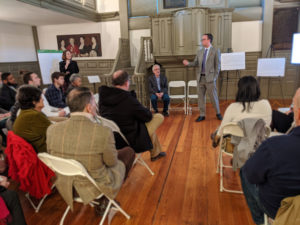 On March 5th, 50 Rhode Islanders assembled in the Newport Historical Society’s Leatherman Program Center to ask themselves “What does it mean to be an American.” Ably facilitated by Wayne Miller and Jim Ludes from Story in the Public Square, the group contemplated ideals and myths, diversity and coherence, and the grim realities of our history.
On March 5th, 50 Rhode Islanders assembled in the Newport Historical Society’s Leatherman Program Center to ask themselves “What does it mean to be an American.” Ably facilitated by Wayne Miller and Jim Ludes from Story in the Public Square, the group contemplated ideals and myths, diversity and coherence, and the grim realities of our history.
The conversation began with the honest, thoughtful commentary of a 17 year-old Indigenous Rhode Islander, who suggested that America was his home, but perhaps not his country. He went on to say that he felt that history had created this rift, and that hiding the history of Native American genocide only continued to support it. When asked if anyone else in the room felt a similar disconnect, several attendees of African descent raised their hands.
What followed was over an hour of civil, and civic conversation. The goal of this gathering was not to come to a consensus or determine the rightness or wrongness of any given perspective, but rather to listen and hear each other out. While it is likely – indeed I know for sure – that there were darker thoughts, and more pointed disagreements than were expressed in this first meeting, we all heard a diversity of opinions, concerns and perspectives on being American in 2020. And no shouting.
Several threads emerged for me, and I should emphasize that these are things that I personally took away from the conversation, and deserve continued examination. One is that it was suggested more than once that America is so diverse that perhaps it has never and will never enjoy a general agreement about “being American.” Our political system, the one thing that, it was suggested, actually unites us, is deployed markedly differently in our various regions and states. And it was noted that the term “American” has been used to narrow and exclude as often as it has to unify us during the course of our history. Even the idea of the goal of a unified culture has been used as a weapon to force assimilation to an assumed norm on unwilling populations.
It was also much discussed that the myths of American history can be ennobling, but also terribly divisive. When we write the stories of the Native Nations out of our histories or minimize the impact that allowing the enslavement of people of color had on our economies and all of our psyches, we allow the narrative to perpetuate 18th and 19th century racist attitudes into today. These things are divisive and unhelpful to any attempt to create a unified national identity. And, given the human propensity to violence, they are deadly. A strong imperative to collect and teach complete and nuanced history was clearly part of the conversation.
An additional thread that ran through our time together was that America’s stated ideals and strengths – religious freedom, individual liberty, the right to pursue happiness and personal success all have a dark side, as religious freedom has not been complete, individual liberties unequally applied, and the right to pursue success often coming at the expense of others.
In all this, there was also pride in the room. For our history of welcoming those fleeing from war-torn nations, including a moving account of coming to America by boat with immigrants who wept at the sight of the Statue of Liberty, and a testimonial from a recent refugee from genocide, who suggested that she was the “youngest American in the room; not by age.” There was also some entrenched respect for American ideals, no matter how imperfect, especially expressed by those who had spent time living in other places.
It was pointed, and moving, that many participants talked about how being American meant having to work at it. For immigrants, to get themselves here and then work towards becoming citizens. For native peoples and the descendants of the enslaved – in fact all people of color — to fight for the rights given freely to others. And for any of us, really, to fight to make America a place that lives up to its ideals and makes us proud to belong here. In fact, one commenter suggested that the unwillingness to accept the status quo might be the most American thing of all.
Towards the very end, someone was brave enough to say that, in spite of hearing from Natives, immigrants, African Americans and citizens of all walks of life, the whole conversation seemed elitist. He asked how we thought this kind of conversation would sound to regular Americans, bringing us right back to the question at hand. What does it mean to be an American?
The NHS will be hosting events in this series of Civic Conversations through 2020. Each will be devoted to a question that we are asking ourselves today. The idea we are exploring is that honest conversation, listening and a modicum of historical context can help us all be better Americans. Please join us or follow us to stay informed about this and all of our other activities.